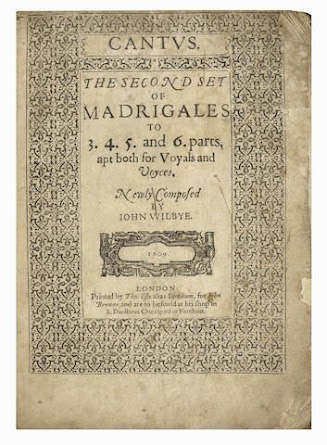John Wilbye’s “Oft have I vowed”
Throughout September, the Daily Classical Music Post celebrates the music of 15th-, 16th-, and 17th-century England.
John Wilbye (1574–1638) is mostly known for his madrigals, although he did compose some religious music as well as at least one piece for virginals. He never married, but his madrigals are full of stories of love and longing. Wilbye’s main influence was Thomas Morley. Edmund Fellowes once said of Wilbye (in 1915), “[I]n his two published Sets alone, Wilbye produced as many as sixty-four madrigals, scarcely any of which fall below the very highest standard of excellent, characterized, as they are, by a polished style, a keen sense of imagination, and a seriousness of purpose, showing also that their composer had a rare skill in all the musical devices known at the period in which he lived.”
“Oft have I vowed” is in Wilbye’s Second Set of Madrigals for 3-6 voices, published in 1598. It is one of the darker madrigals; this is not a happy love story. Michael Morrison says of Wilbye’s Second Set of Madrigals that it “is thought of by many scholars as the pinnacle of madrigal writing.” Diane Kelsey McColley says, “Wilbye’s masterful ‘Oft have I vowed,’ after abundant polyphonic repetition on ‘millions of teats’ (the repeated t’s splashing audibly), a heaving prolongation on ‘sighs,’ and heavily declining notes as the lover’s heart pines, suddenly bares the bass line on ‘barren hopes’.”
Oft have I vow'd how dearly I did love thee,
And oft observ'd thee with all willing duty,
Sighs I have sent, still hoping to remove thee:
Millions of tears I tender'd to thy beauty,
Yet thou of sighs and silly tears regardless,
Suff'rest my feeble heart to pine with anguish,
Whilst all my barren hopes return rewardless,
My bitter days do waste, and I do languish.
My classical music post for today is John Wilbye’s “Oft have I vowed.”





Comments
Post a Comment